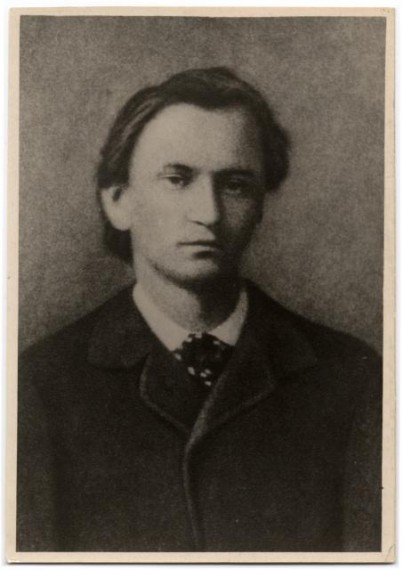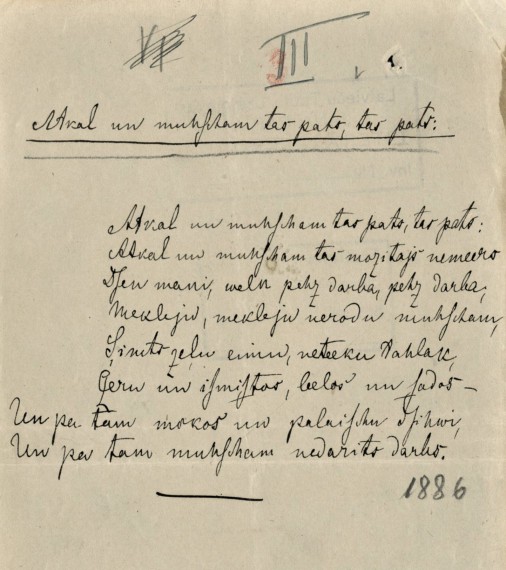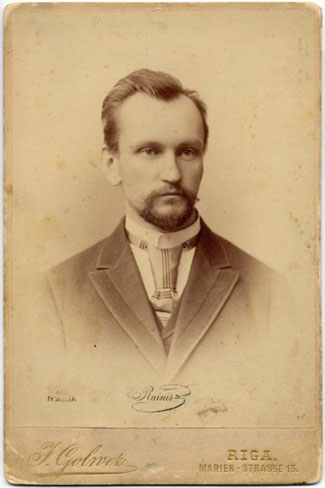In 2012, there was a creative competition “Why is the pain of my heart keeping me from writing poetry?” Second-place winner Santa Taimiņa wrote an essay titled “The path of life and searches for life values by Rainis and me in high school,” and in it she wrote: “As I looked at the life path and search for life values when Rainis was young, I was surprised that the poet had the same problems as other young people ˗ doubts, a search for close friends and a search for where to go. Jānis Pliekšāns’ dairy shows that he was the same kind of person as I am. Rainis and I are linked by the desire to ‘escape’ everyday routine. Jānis Pliekšāns became Rainis only once he understood himself and his goals in life, only when he began to believe in himself. Reading his diaries has allowed me to trust myself and my strength.”
Why is the pain of my heart keeping me from writing poetry?
This is the question in Rain's journal. What did the young poet think of the years of gymnasium and university?
Jasmuiža, 2019. Photo by Solvita Kleinarte

"Jasmuiža", 2015. Photo by Kristaps Runcis
The last estate that was leased by Krišjānis Pliekšāns was Jasmuiža. Jānis Pliekšāns, who would become the poet Rainis, spent his study holidays there and thought a lot about the purpose of life. Who am I? Should I be a poet? How can I overcome laziness and shyness? If we read Rainis’ diaries from the period when he was young, we find answers to some of these questions:
September 19, 1882, evening Why can I not express my thoughts, and why is the pain of my heart keeping me from writing poetry? While these faithless and demonic thoughts tormented me, I could not write anything. They overcame me, pressured me, made me unhappy and sad, and finally I turned into a fool and a totally everyday person who stupidly wants to be a poet and lacks every strength.
The house at Jasmuiža, view from the Jaša River, 1911. Photo by Jānis Sermonis

Jānis Pliekšāns as a student in St Petersburg, 1884˗1888. Photo cut out from a group photo. Unknown photographer.
Rainis was very self-critical, sensitive and easily injured when he was young. He was not sure of himself and his talent as a poet. Rainis was lonely and misunderstood, and that was not true just when he was young. Rainis could be true and honest only when he wrote his doubts, emotions and experiences in his journal.

Rainis, "Once Again and Eternally the Same, the Same" (1886). RTMM 23093/5
Rainis spent a lot of time reading and seeking answers to questions in literature. Schiller’s “The Robbers,” Goethe’s “The Sufferings of Young Werther,” Gogol’s “Dead Souls” and many other classics from global literature helped the young man to deal with his tormenting searches. Keeping a diary was a form of psychotherapy and self-analysis, and that helped Rainis to bring order to his thoughts. He recorded painful things and experiences, and he found answers.

Rainis, 1893. Photo by Ivans Golvers.
A 21st-century young person who is seeking answers at a time when life seems heavy and lonely can try to keep a journal ˗ a real one with a pen and paper. Read books. Read Rainis’ diary and learn that issues that are important today were not alien to a young man in the 19th century.
Author: Solvita Kleinarte.
Materials used from the collection of The Literature and Music Museum.

